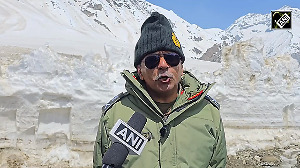 Even as India prepares to sit for the first high-level dialogue on intellectual property rights (IPR) law and patents with the US on Monday, work on rolling out a 'National IPR Policy' has been moving at a rather slackening pace with the industry pointing fingers at the government's initiative.
Even as India prepares to sit for the first high-level dialogue on intellectual property rights (IPR) law and patents with the US on Monday, work on rolling out a 'National IPR Policy' has been moving at a rather slackening pace with the industry pointing fingers at the government's initiative.
The announcement that India is going to bring out its own IPR policy was made in early September, by commerce and industry minister Nirmala Sitharaman.
Since then, the government has only established a think tank. It was only this month that the department of industrial policy and promotion (DIPP) invited comments from all stakeholders on the policies for consideration by the think tank, which has been given the task to dish out a draft policy.
So far, DIPP, nodal agency in shaping the policy, has had only one meeting with members of the think tank.
The plan is that once the draft policy is ready, it will be circulated to all ministries. Then, it will be opened for stakeholders' comments and to the general public.
After this, the final policy will be rolled out once the Cabinet approves it.
The think tank, of only six members, has yet to get a proper office infrastructure and has been unable to "settle properly", sources told Business Standard. India has always maintained that its IPR and patent laws are in compliance with the World Trade Organization's agreement on Trade-Related Aspects of Intellectual Property Rights.
However, in the terms of reference for the IPR think tank, it is stated the body will seek "best practices" around the world, highlight "anomalies" in the present IPR legislations and give suggestions on "improving" India's IP infrastructure.
According to D G Shah of the Indian Pharmaceutical Alliance, India does not need a policy on IPR in the first place, as it follows global norms.
"The misgivings are magnified by the terms of reference. It assumes the current IPR regime is deficient, which it is not. We are apprehensive of the whole exercise and its outcomes," he said.
The think-tank is headed by Prabha Sridevan, retired judge of the high court at Chennai; Pratibha M Singh, a lawyer who represented Cipla in the Novartis case; lawyer Punita Bhargava, also related to finance minister Arun Jaitley, Unnat Pandit, who comes from the generic pharmaceutical industry; Rajeev Srinivasan, a management consultant and columnist; and retired civil services officer Narendra K Sabharwal, who had worked with the World Intellectual Property Organization in 1991.
"There is a need for innovation in healthcare and we must demonstrate India's genuine interest in fostering local innovation and improving patient access to new medicines. The think-tank for formulating a national IPR policy is a good idea, but its membership lacks a diversity of perspective. We are disappointed that the research-based industry finds no representation at all," said Ranjana Smetacek, director general, Organisation of Pharmaceutical Producers of India.
India had been engaged in a contentious battle with the US over the issue, especially in the pharmaceutical sector.
This peaked when the previous government decided to grant a compulsory license to Natco Pharma to produce and sell generic versions of Bayer-Onyx's cancer drug, Nexavar.
Things became worse last year in April when the Supreme Court rejected a patent application made by Swiss company Novartis for its cancer drug, Glivec. Both decisions triggered a trade issue between India and the US.
The office of the US Trade Representative in its 2014 'Special 301 Report', accused India of having one of the world's weak IPR regimes and for the first time launched an 'Out-of-Cycle' Review of India's IPR laws.












 © 2025
© 2025